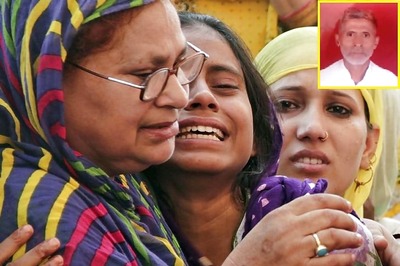
views
Several countries across the world continue to battle the third wave of the coronavirus and have also ramped up the vaccination drives to protect their citizens from the deadly infection. Unfortunately, still, a little hesitancy is left among some people to get jabbed. In India, the government has made anyone with the age of 15 or above eligible to take the vaccine against the Covid-19. The development of safe and effective Covid vaccines is a huge step forward to end the pandemic, which has now also impacted the lives of children and young people.
Governments across the world have been making Covid-19 vaccination mandatory for health workers and other high-risk groups, pushed by a sharp upturn in infections caused by the Delta variant and a slowdown in vaccinations, as well as the new Omicron variant. A growing number of countries are also making shots compulsory for public servants and other workers.
With the emergence of the Omicron variant and prediction of new Covid-19 variants in the future, several health experts have appealed to people to get vaccinated as soon as possible and also urged the nations to make vaccination compulsory for all. Getting vaccinated reduces the severity of the infection and less serious illnesses mean fewer deaths and less pressure on medical infrastructure.
‘Expect More Worrisome Variants After Omicron’
Scientists warn that Omicrons whirlwind advance practically ensures it won’t be the last version of the coronavirus to worry the world. Every infection provides a chance for the virus to mutate, and Omicron has an edge over its predecessors: It spreads way faster despite emerging on a planet with a stronger patchwork of immunity from vaccines and prior illness.
That means more people in whom the virus can further evolve. Experts don’t know what the next variants will look like or how they might shape the pandemic, but they say there’s no guarantee the sequels of Omicron will cause milder illness or that existing vaccines will work against them.
It’s why they urge wider vaccination now, while today’s shots still work. “The faster Omicron spreads, the more opportunities there are for mutation, potentially leading to more variants,” Leonardo Martinez, an infectious disease epidemiologist at Boston University, was quoted as saying by Associated Press.
Since it emerged in mid-November, Omicron has raced across the globe like fire through dry grass. Research shows the variant is at least twice as contagious as Delta and at least four times as contagious as the original version of the coronavirus.
Omicron is more likely than Delta to re-infect individuals who previously had Covid-19 and to cause breakthrough infections in vaccinated people while also attacking the unvaccinated. The World Health Organization (WHO) reported a record 15 million new Covid-19 cases for the week of January 3-9, a 55 per cent increase from the previous week.
It’s the longer, persistent infections that seem to be the most likely breeding grounds for new variants, said Dr. Stuart Campbell Ray, an infectious disease expert at Johns Hopkins University to Associated Press. “Its only when you have very widespread infection that you’re going to provide the opportunity for that to occur.”
Ray likened vaccines to armor for humanity that greatly hinders viral spread even if it doesn’t completely stop it. For a virus that spreads exponentially, he said, “anything that curbs transmission can have a great effect. Also, when vaccinated people get sick, Ray said their illness is usually milder and clears more quickly, leaving less time to spawn dangerous variants.
Countries That Made Vaccine Mandatory
• All Adults: Countries like Austria, Ecuador, Germany, Indonesia, Tajikistan, and Turkmenistan have planned to make jabs mandatory for all adults from February.
• Government employees, public and private sector workers: Countries like Canada, Costa Rica, Czech Republic, Croatia, Denmark, Egypt, Fiji, France, Ghana, Hungary, Italy, Lebanon, New Zealand, Oman, Poland, Russia, Saudi Arabia, US, Turkey, Ukraine and Latvia have made jabs mandatory for all public sector employees, citizens who need services in public institutions.
• Elderly: Countries like Czech Republic, Malaysia, Greece and Russia have made Covid-19 vaccinations mandatory for people aged 60 and over in a move to quell a resurgent virus that is burdening a frail healthcare system.
• Children: Costa Rica has made vaccination must for children aged five and up. While Lithuania has made it mandatory for those over 16s, considering for over 12s.
Rising Demands to Make Vaccination Mandatory in India
The Maharashtra government has recently asked the Centre to consider making vaccination mandatory for everyone as a solution to vaccine hesitancy. As per a Times of India report, the Maharashtra government has been struggling to increase its speed of inoculation and has taken several steps to bring it on par with the national average. But several districts still continue to be on the bottom of the ladder.
“Vaccination is the biggest weapon to slow down the surge and the Centre must come out with a policy to address hesitancy,” Tope told TOI.
In an opinion piece to News18, Amir Ullah Khan is Research Director, Centre for Development Policy and Practice, said that is more than high time for India to declare an emergency and mandate Covid-19 vaccines for all. By now, we have irrefutable evidence that vaccines work and that there is really no evidence of any collateral damage. It is also clear that unvaccinated people are vectors carrying the infection wherever they travel. Vaccinated people are also getting infected but constitute a far lower risk, both to themselves and to their neighborhood. In most discussions on bioethics, it is now widely accepted that mandatory vaccinations are justified when they help eradicate disease, or when they fight against seriously infectious and contagious antigens, he opiniated.
The clear message that needs to be sent out is: people have no choice but to get vaccinated. Similar mandates have been issued on using seat belts and wearing helmets, with those flouting the rules being penalized. There can be some exemptions for vaccine, like people who cannot get vaccinated on account of some allergy or disease.
Criticism will come from various quarters but so long as the government is seen as doing everything possible to fight the pandemic and asking the public to cooperate by taking the vaccine, this move will help protect India and Indians from the vagaries and uncertainties of new Covid variants, Khan said.
(with inputs from Reuters and Associated Press)
Read all the Latest India News here



















Comments
0 comment